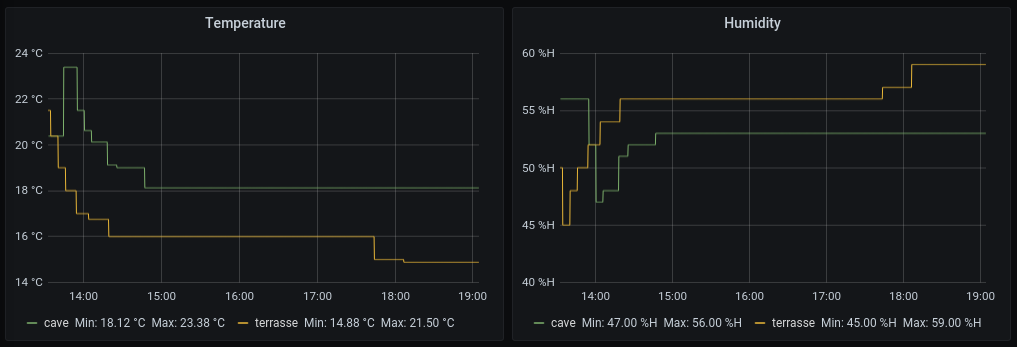shelly-ht-action-prometheus is a tool to expose action calls from a Shelly H&T to Prometheus.
Shelly H&T sensor supports MQTT but that requires you to run a MQTT broker on your network. Using a remote broker is not possible because the sensor cannot communicate with the MQTT broken over TLS.
Collecting the sensor data via an authenticated action call over HTTPS seemed the easiest, and most secure way.
Pre-built binaries are available in the releases.
You can verify the authenticity of the binaries using Cosign. To do so, download our public key cosign.pub and then:
$> cosign verify-blob -key cosign.pub -signature shelly-ht-action-prometheus_<Version>_<OS>_<Arch>.sig shelly-ht-action-prometheus
The service can be launched like this:
$> SENSOR_PASSWORD=<passphrase_to_submit_sensor_data> \
ADDRESS_METRICS=127.0.0.1:17796 \ # Listen address exposing metrics to scrap with Prometheus
ADDRESS_SENSOR=127.0.0.1:17795 \ # Listen address for submitting the action call from the sensor
shelly-ht-action-prometheus
If you want to run it as a SystemD service you can check the content of shelly-ht-action-prometheus.service.
A Docker image is available: ghcr.io/lesuisse/shelly-ht-action-prometheus.
You can verify the authenticity of the image using Cosign. To do so, download our public key cosign.pub and then:
$> cosign verify -key cosign.pub ghcr.io/lesuisse/shelly-ht-action-prometheus
You need to set the environment variable SENSOR_PASSWORD when launching the container, for example with the Docker CLI:
$> docker run --rm -d \
-e SENSOR_PASSWORD=<passphrase_to_submit_sensor_data> \
-p 127.0.0.1:17796:17796 \ # Listen address exposing metrics to scrap with Prometheus
-p 127.0.0.1:17796:17795 \ # Listen address for submitting the action call from the sensor
ghcr.io/lesuisse/shelly-ht-action-prometheus
It is recommended to not expose directly the service but to put it behind a reverse proxy, so you can communicate with it over HTTPS.
On the configuration panel of the Shelly H&T sensor, you need to add a new action call.
The action call URL needs to have the following format:
https://sensor:<sensor_password>@example.com/sensors/<sensor_name>
<sensor_password> is the passphrase you used when your started the service. <sensor_name> is the name used to label
the sensor in Prometheus.
The service exposes 3 metrics which are all labelled with a name:
shellyht_temperature_celsius: the temperature reported by the sensorshellyht_humidity_percent: the humidity percentage reported by the sensorshellyht_last_report: the last time the sensor reported a value
